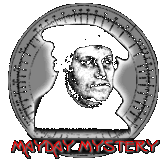
|
Delivery to my PO box, somewhere around 3/22/2006.
Delivery contents:
04.05.2006 - bhance - well, it's a colonial banknote: Massachusetts $8 note. (ref). Specifically, one signed by William Dawes. The White Hat 04.20.2006 That particular note is a facsimile from a set of reproductions entitled "Colonial and Revolutionary Currency 1773-1781," specifically it's from set B. Obtainable here: http://www.libertybellmuseum.com/MuseumShop/colonialbanknotesetB.htm near a terminal 05.02.2006 Had a thought or two about this one, take them for what they're worth but I think it all fits. 1780 is the date on the currency and that is before the US Constitution. Massachusetts was still ruled as a theocracy and the rest of New England with it. The US Constitution made "the wall between church and state." The rest of the thought is that all this paper currency was considered worthless at one point and then Alexander Hamilton had a stroke of genius and somehow talked George Washington and other influential rebels/patriots, whatever, into backing a total repayment of the paper debt. That immediately gave the new (after 1789) US government international financial power because it was known all over the world that the USA would honor its contractual obligations. Sticking those two points together it might mean that the now discarded theocracy (remember 1780 is prior to the Constitution) will also be made "paid in full" just as the supposedly worthless rebel currency which most people even in America thought was mainly good for use in the privy. dunkind 10.23.2006 clue: When I was a kid in western Massachusetts I worked on son a farm the summer before I went to Boston College. The farm was owned by an old Yankee. (Yankee is a good term in New England and even the micks and the guineas and even the krauts ape the Yankees even as they deny doing it.) Reading what your other contributors have written about this one brought to mind one time when the old Yankee and I were knocking back some hard cider that he made in one of the barns. We weren't exactly drunk more like expansive and thoughtful. It was Saturday afternoon and he looked at me and laughed, then said--"Jim [my real name] it's good thing you didn't work here in my great-grandfather's time as you haven't been to church since I hired you." I asked if his great-grandfather would have fired me. He said, "Hell no, he'd turn you over to the sheriff and your ass would rot in jail for months on end or they'd put you to forced labor on the county farm. Attendance was mandatory and there was only one church." I knew from his tone that he wished it were still so. I've known others like him and the rest of it is so obvious that you see the point. Opaleg 12.26.2007 First off, If I rememeber correctly that exact note was generally worth nothing however I could be wrong. I know The Orphanage mentions a lot of things without substance and this may be another of those things. On a side note, the US dollar now and for decades is worthless in every possible translation of the term due to no value or subtance being pegged to it, beyond the fiat of the "US" government. Sutter's Suprise may refer to gold and the gold that is not pegged to the US dollar and many other currencies in the world. Stephan 03/04/2018 The Spanish dollar, also called Piece of Eight, was the coin upon which the original United States dollar was based, and it remained legal tender in the United States until the Coinage Act of 1857. Congress's first Coinage Act, in 1792, decreed that the "DOLLAR" was "to be the value of a Spanish milled dollar as the same is now current, and to contain" 371-1/4 grains (troy) of pure silver. There is a monumental 2-volume book called Pieces of Eight by Edwin Vieira about "The Monetary Powers and Disabilities of the United States Constitution". ..fiat money, banking cartel, fractional-reserve banking, gold standard, the Federal Reserve (the creature of Jekyll Island), monetary law and history.. Look what the bible has to say: "The love of money is the root of all evil": (1 Timothy 6:10) "If thou lend money to any of my people that is poor by thee, thou Shalt not be to him an usurer, neither shalt thou lay upon him usury." Exodus 22:25 "Take no usury of him, or increase . . . thou shalt not give him thy money upon usury." Leviticus 25:36-37 "Unto thy brother thou shalt not lend upon usury: That the Lord they God bless thee." Deuteronomy 23:20 In the early Church, any interest on debt was considered usury. Click here to submit a clue for this page. |
